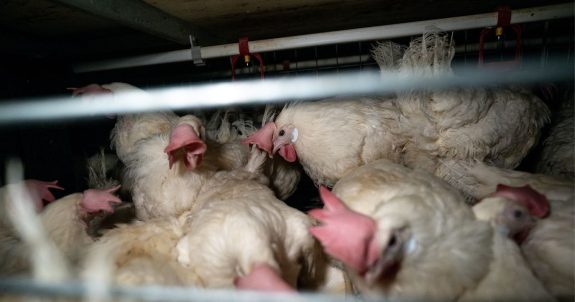Many Canadians are surprised to learn that there are no provincial or federal laws regulating the welfare of animals on farms in Canada, despite our progressive reputation.
Instead, the government relies on The National Farm Animal Care Council (NFACC), an industry-led group without lawmaking power. NFACC creates non-legally binding standards for farmed animals through voluntary codes of practice. These codes are meant to be revised every 10 years, with smaller reviews every five years. Yet in its 20-year history, NFACC has consistently allowed the industry to continue subjecting farmed animals to painful and invasive practices such as extreme confinement, and denying them the ability to express natural behaviours.
A Missed Opportunity for Real Change
When codes undergo revision, it is an opportunity for industry to respond to public expectations about how farmed animals deserve to be treated, and address some of the most egregious practices. However, NFACC has once again failed to meet this responsibility.
Today, the NFACC has launched a public commentary period for three minor updates to the code for hens used for eggs, the 2017 Layer Code.

Layer Code: Three Years Late & Still Supporting Cages
The five-year review of the Layer Code took place out of public view in 2022. In the years since, animals have continued to endure poor standards that were identified as in need of revision. This shows not only the failures of the NFACC codes and processes, but the heartbreaking animal suffering that goes unaddressed by a system designed to cater to industry interests. Three years after the code review, NFACC is only now sharing the results of the review that only cover minor adjustments, such as space allocation for pullets and the design of multi-tiered housing systems.
Shockingly, the updates ignore one of the most egregious practices—the cruelty of confining hens in cages. Animal Justice investigations have repeatedly exposed the cruelty of cages in farms across Canada.
The delays and inadequacies of these amendments highlight the underlying issues of how NFACC operates—in particular how the structure and processes fail to provide a framework to protect animals and address the most pressing issue of phasing out cages for hens altogether.
Canada Falling Further Behind US in Banning Cages
While the proposed updates include some minor recommended improvements, they fail to address the cruelty of cages and push the industry towards cage-free systems. Currently, 80 percent of egg-laying hens in Canada are trapped in cruel, cramped wire cages, suffering from injuries, illness, and premature death.
The announcement of the public commentary period is quite timely.
Exactly 10 years ago today, the Layer Code was released, with a commitment to move away from battery cages by 2037. Some animal welfare organizations even praised the new code and the industry for committing to phasing out “small cramped cages for hens over the next 15 years”. However, this commitment was misguided at best, as it did not include getting hens out of cages altogether, but allowed for a shift from battery cages to “enriched” battery cages, which are barely distinguishable from conventional cages.
Enriched battery cages are a hollow promise, and do not fix the fundamental welfare problems with cage confinement. Hens still spend their lives on wire flooring, suffering from stress, disease, feather loss, weakened bones due to restricted movement, and limited ability to engage in natural behaviors. These welfare issues have prompted a shift among many consumers, companies, states, and countries around the world toward cage-free alternatives.
The European Union, United Kingdom, and many US states have already enacted laws to entirely eliminate caged housing for hens. But, a decade later, Canada is still lagging behind, allowing an industry that profits from the confinement and suffering of egg-laying hens to decide the future of cage use through NFACC Codes of Practice.
Many Canadians are surprised to learn that there are NO provincial or federal laws regulating the welfare of animals on farms 🐔⚠️ Share on XNFACC Codes Prioritize Industry Interests Over Animal Welfare
NFACC’s refusal to phase out cages demonstrates how deeply flawed its process is.
The code development and amendment lacks transparency and is designed to cater to industry—so much so that this very Layer Code update was delayed by two years as industry was not ready to begin working on it. Further, there is no clear process for how public input will influence the final version of the code, leaving citizens without assurance that their voices will be heard.
With every code update, the inadequacies of the industry-led NFACC model of voluntary standards become clearer. The failure of the newly proposed layer code amendments to address the critical issue of cages shows the importance of moving away from a system that allows a for-profit industry to make up its own rules.
Speak Up for Hens
NFACC’s failures make it clear that voluntary standards cannot protect farmed animals. We must demand better. Please take a moment to submit your comments to NFACC before the public consultation closes on May 26, 2025. We encourage commenters to provide feedback on NFACC’s refusal to recommend phasing out cages under every proposed amendment. Within the survey, share your unique perspective, be polite, and be concise. Use our suggestions below to guide your comments!
- Canada is going in a troubling direction by moving toward enriched cages—even though over 75 percent of Canadians oppose caging hens entirely.
- Keeping hens in cages is cruel and unacceptable, whether the cages are “enriched” or “conventional”.
- All forms of caged housing force birds to live in close quarters, deprived of the ability to engage in most of their natural behaviours.
- Undercover exposés by animal protection groups have raised public awareness about the shocking cruelty behind confining hens in cages for their eggs.
- Canada is falling behind—with the European Union, United Kingdom, and several US states having enacted laws to entirely eliminate cage housing for hens.
Banner: Abigail Messier | We Animals




